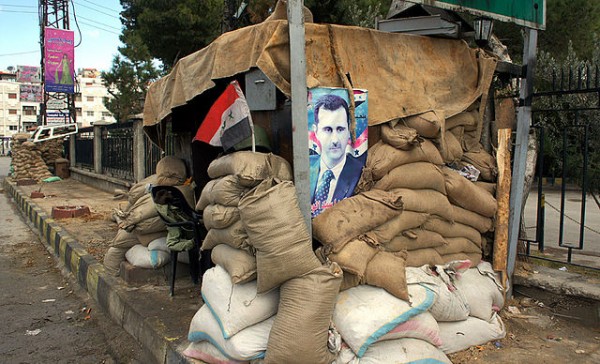
Elizabeth Arrott
“It starts, as always, with a dream, a dream of youth, liberty, and collective joy,” writes Jonathan Littell, “and it ends, as all too often, in a nightmare.”
Now in its fifth year, that nightmare has left more than 220,000 dead and nearly eight million uprooted by violence in Syria. Another 3.8 million people have fled, seeking refuge in neighboring countries like Lebanon, Jordan, Northern Iraq, Turkey, and Egypt.
As the world’s largest humanitarian disaster since the Second World War continues to deepen, Littell has published his Syrian Notebooks in English for the first time. These raw journal entries, made while traveling to Homs in mid-January 2012, originally formed the basis for his articles that appeared in the French daily Le Monde.
The Syrian uprising was nearing the end of its first year in 2012, and Littell, together with a photographer who also served as his Arabic interpreter, a man referred to simply as “Mani,” spent three weeks in Homs, the former rebel stronghold, a hundred miles north of Damascus.
Inspired by Manon Loizeau’s documentary “L’immigration: Aux frontières du droit,” filmed in the city in 2011, Littell had set out to bear witness to the atrocities committed by Bashar al-Assad’s regime.
The book begins with an account of how he was smuggled across the Lebanese border from Tripoli in a white minivan by stocky, smiling, bearded opposition fighters of the Free Syrian Army (FSA). At the time, the FSA still held out hope that Western countries might intervene if only foreign journalists, who had been virtually banned from the city, could “shock Western consciousnesses” by shining a spotlight on the “unutterable violence.”
It was a time, Littell writes, when “the people were still gathering daily to demonstrate – calling for the fall of the regime, loudly asserting their belief in democracy, in justice, and in a tolerant, open, multi-confessional society, and clamoring for help from outside, for a NATO intervention, for a no-fly zone to stop the aerial bombardments.”
That help would not come, and Littell instead finds himself chronicling the descent of a “popular, broad-based, proletarian and peasant uprising” as it mutates into a bloody civil war. Ethnic and sectarian violence, he writes, is deliberately instigated by an embattled al-Assad family, which fosters the rise of radical Islamist armed groups to both discredit the popular revolt and fracture the more moderate FSA.
In Homs, Littell moves between safe houses and underground medical clinics, speaking to those who have experienced brutality (including torture) at the hands of al-Assad’s army and security services. And amid frantic visits to the front lines, he witnesses the first mass murders of Sunni families in broad daylight, heralding the end of a dream of peaceful revolution and the beginnings of what would become an ultra-violent fundamentalist movement.
The 2011 uprising, Littell says, felt like a “losing battle,” for
if al-Assad was not overthrown soon – something that would only be possible with strong Western support, including the provision of sophisticated weaponry and possibly the enforcement of a partial or even total no-fly zone over Syria – the center would not hold, and worse forces would emerge, driving the revolution into the arms of criminals and Islamist radicals.
Throughout the book, Littell wants the reader to know that it didn’t have to be that way. “Before the nightmare,” he writes, “a nightmare so dense and opaque it seems to have no beginning, there had been a dream.”
A novelist and former humanitarian worker, who now lives in Spain, Littell describes Syrian Notebooks as “a document, not a work of literature.” It is, he says, a raw transcription. At times confused and fragmentary – and sometimes poetic – it is an account of a dream shattered by the chaos and horrors that stamp out the hopes and lives of those fighting for freedom and innocent civilians caught in the middle.
This book is more than a glimpse into the al-Assad regime’s remorseless assault on Homs “without any outside witness.” It is also a scathing indictment of the world’s indifference to the greatest human catastrophe of the century – in Littell’s view, its complicity.
“Yes, some of our leaders have forcefully condemned it,” Littell writes, but “still, they let it continue.” To those who say the world had no choice but to leave Syrians to their fate, he responds: “you always have a choice, as did those who in Syria rose up against Bashar al-Assad and his putrid, senile, and ultimately doomed regime.”